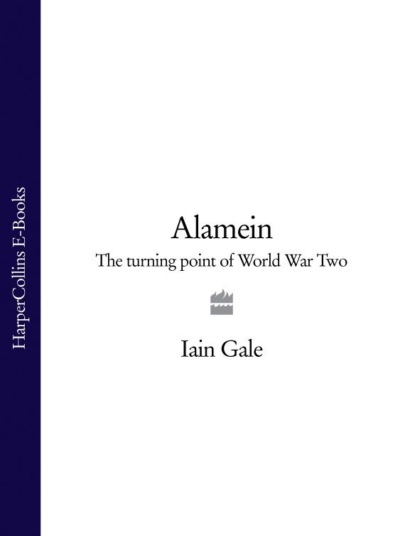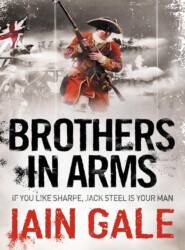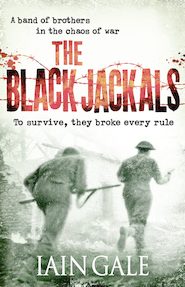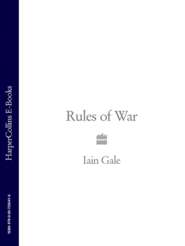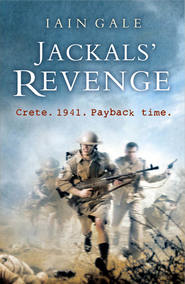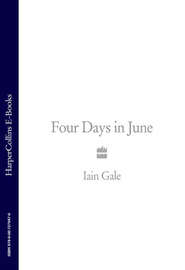По всем вопросам обращайтесь на: info@litportal.ru
(©) 2003-2024.
✖
Alamein: The turning point of World War Two
Настройки чтения
Размер шрифта
Высота строк
Поля
Alamein: The turning point of World War Two
Iain Gale
The superb novelist of men at war moves into the twentieth century and World War Two, telling the story of the eleven days in the sands of North Africa that would change history foreverThere are some battles that change the course of history: Alamein is one of those.In October 1942, Britain and its allies were in real difficulties: Germany and its Axis partners seemed to be triumphant everywhere - in Europe, in Russia, in the Atlantic and were now poised to take the Suez Canal. It was in North Africa that the stand was made, that the tide of World War Two began to turn.It was a battle of strong characters: the famous battle commander Rommel and the relatively untested new British commander, Montgomery, leading men who fought through an extraordinary eleven day battle, in an unforgiving terrain, amid the swirling sandstorms and the desert winds.Iain Gale, author of the outstanding historical novel Four Days in June on the battle of Waterloo, tells the dramatic story through seven characters, almost all based on real people. Drawn from both sides of the conflict, they include a major from a Scottish brigade, the young lieutenant in the thick of the tank battle, the Australian sergeant with the infantry, the tank commander of the Panzer Division and the charismatic Italian commander of a parachute battalion. Through them and others we see the flow of battle, the strategies, the individual actions and skirmishes, the fear, the determination, the extraordinary courage on both sides.
Alamein
Iain Gale
The turning point of World War Two
To my mother, who heard the church bells ring and to Captain Philip Harris, Royal Sussex Regiment who was there
Table of Contents
Cover Page (#u44d8c4ed-0cd7-580e-b352-2d83c14dda72)
Title Page (#u966c8b96-656b-5e39-af08-cb4672899783)
Dedication (#uc12bfe9c-0d09-5fcd-baae-17f4aaa8fc0d)
Maps (#u20182691-c5b1-5dae-9703-05a0faa0e934)
PART ONE Operation Lightfoot (#uafbd581f-3301-572e-849e-607785b2aabf)
Friday 23 October (#ubb349337-6514-571d-b14c-a606cea54825)
Saturday 24 October (#litres_trial_promo)
PART TWO The Dog Fight (#litres_trial_promo)
Sunday 25 October (#litres_trial_promo)
Monday 26 October (#litres_trial_promo)
Tuesday 27 October (#litres_trial_promo)
Wednesday 28 October (#litres_trial_promo)
Thursday 29 October (#litres_trial_promo)
Friday 30 October (#litres_trial_promo)
Saturday 31 October (#litres_trial_promo)
PART THREE Operation Supercharge (#litres_trial_promo)
Sunday 1 November (#litres_trial_promo)
Monday 2 November (#litres_trial_promo)
Tuesday 3 November (#litres_trial_promo)
Wednesday 4 November (#litres_trial_promo)
Biographical Notes (#litres_trial_promo)
HISTORICAL NOTE (#litres_trial_promo)
AUTHOR’S NOTE (#litres_trial_promo)
By the same author (#litres_trial_promo)
Copyright (#litres_trial_promo)
About the Publisher (#litres_trial_promo)
Maps (#ulink_32d5199a-d322-544b-82cc-a5da8854af7e)
PART ONE Operation Lightfoot (#ulink_98346b74-d102-5f15-ba55-0e651ee42dc2)
Friday 23 October (#ulink_48003de9-aa8f-537d-ab1b-6fc6131387a4)
ONE
9.00 a.m. Forward HQ, Eighth Army Burgh-el-Arab, El Alamein Freddie de Guingand
The stage was set. The players were waiting in the wings. They had rehearsed to the last detail and Montgomery, he knew, was now fully satisfied that they were ready. Yesterday the General had addressed the men, or their officers at least. Everyone down to lieutenant-colonel, from all three corps had been there. De Guingand had never heard his commander talk with more confidence. It would be, Montgomery had told them all, a ‘killing match’, a ‘dog-fight’ that would last for as many as ten days, or even twelve.
De Guingand had been surprised by the vehemence of the rhetoric. They must all, Montgomery had said, be imbued with a burning desire ‘to kill Germans’.
‘The German’ he had told them, ‘is a good soldier and the only way to beat him is to kill him in battle.’ Even the padres, Monty had joked, should kill Germans: ‘one per weekday and two on Sundays!’
That of course had provoked a real roar of laughter from the officers. And that de Guingand knew was all part of the commander’s aim. Morale was of the essence:
‘Morale is the big thing in war, gentlemen. We must raise the morale of our soldiery to the highest pitch; they must enter this battle with their tails high in the air and with the will to win. And win we shall, my friends. Of that I am in no doubt.’
De Guingand looked at the map spread out before him on the table. Surveyed for one last time the positions of the Divisions, the Brigades. Hoped to God they had got it right. For all their sakes. He moved his eyes across to the right of the map, to where on the table lay the piece of paper containing the typewritten message which had been circulated that morning to all troops serving with Eighth Army. De Guingand glanced at it once again and a paragraph caught his eye:
‘The battle which is now about to begin will be one of the decisive battles of history. It will be the turning point of the war. The eyes of the whole world will be on us, watching anxiously which way the battle will swing.
We can give them their answer at once, “It will swing our way.”’
His eye travelled down the page:
‘Let us all pray that “the Lord mighty in battle” will give us the victory.’
De Guingand peered out of the tent at the endless desert, filled as it was with men and machines frantically going about the business of war. Well, he thought, this was it then. The die was cast and there was nothing that he or anyone else could do about it now. He felt a sudden realization of the responsibility that rested on his shoulders. Montgomery might be the commander, but he knew that it was only through him that those commands must be channelled and that should he make but one mistake; misinterpret one order…
Monty’s penultimate words echoed in his mind:
Iain Gale
The superb novelist of men at war moves into the twentieth century and World War Two, telling the story of the eleven days in the sands of North Africa that would change history foreverThere are some battles that change the course of history: Alamein is one of those.In October 1942, Britain and its allies were in real difficulties: Germany and its Axis partners seemed to be triumphant everywhere - in Europe, in Russia, in the Atlantic and were now poised to take the Suez Canal. It was in North Africa that the stand was made, that the tide of World War Two began to turn.It was a battle of strong characters: the famous battle commander Rommel and the relatively untested new British commander, Montgomery, leading men who fought through an extraordinary eleven day battle, in an unforgiving terrain, amid the swirling sandstorms and the desert winds.Iain Gale, author of the outstanding historical novel Four Days in June on the battle of Waterloo, tells the dramatic story through seven characters, almost all based on real people. Drawn from both sides of the conflict, they include a major from a Scottish brigade, the young lieutenant in the thick of the tank battle, the Australian sergeant with the infantry, the tank commander of the Panzer Division and the charismatic Italian commander of a parachute battalion. Through them and others we see the flow of battle, the strategies, the individual actions and skirmishes, the fear, the determination, the extraordinary courage on both sides.
Alamein
Iain Gale
The turning point of World War Two
To my mother, who heard the church bells ring and to Captain Philip Harris, Royal Sussex Regiment who was there
Table of Contents
Cover Page (#u44d8c4ed-0cd7-580e-b352-2d83c14dda72)
Title Page (#u966c8b96-656b-5e39-af08-cb4672899783)
Dedication (#uc12bfe9c-0d09-5fcd-baae-17f4aaa8fc0d)
Maps (#u20182691-c5b1-5dae-9703-05a0faa0e934)
PART ONE Operation Lightfoot (#uafbd581f-3301-572e-849e-607785b2aabf)
Friday 23 October (#ubb349337-6514-571d-b14c-a606cea54825)
Saturday 24 October (#litres_trial_promo)
PART TWO The Dog Fight (#litres_trial_promo)
Sunday 25 October (#litres_trial_promo)
Monday 26 October (#litres_trial_promo)
Tuesday 27 October (#litres_trial_promo)
Wednesday 28 October (#litres_trial_promo)
Thursday 29 October (#litres_trial_promo)
Friday 30 October (#litres_trial_promo)
Saturday 31 October (#litres_trial_promo)
PART THREE Operation Supercharge (#litres_trial_promo)
Sunday 1 November (#litres_trial_promo)
Monday 2 November (#litres_trial_promo)
Tuesday 3 November (#litres_trial_promo)
Wednesday 4 November (#litres_trial_promo)
Biographical Notes (#litres_trial_promo)
HISTORICAL NOTE (#litres_trial_promo)
AUTHOR’S NOTE (#litres_trial_promo)
By the same author (#litres_trial_promo)
Copyright (#litres_trial_promo)
About the Publisher (#litres_trial_promo)
Maps (#ulink_32d5199a-d322-544b-82cc-a5da8854af7e)
PART ONE Operation Lightfoot (#ulink_98346b74-d102-5f15-ba55-0e651ee42dc2)
Friday 23 October (#ulink_48003de9-aa8f-537d-ab1b-6fc6131387a4)
ONE
9.00 a.m. Forward HQ, Eighth Army Burgh-el-Arab, El Alamein Freddie de Guingand
The stage was set. The players were waiting in the wings. They had rehearsed to the last detail and Montgomery, he knew, was now fully satisfied that they were ready. Yesterday the General had addressed the men, or their officers at least. Everyone down to lieutenant-colonel, from all three corps had been there. De Guingand had never heard his commander talk with more confidence. It would be, Montgomery had told them all, a ‘killing match’, a ‘dog-fight’ that would last for as many as ten days, or even twelve.
De Guingand had been surprised by the vehemence of the rhetoric. They must all, Montgomery had said, be imbued with a burning desire ‘to kill Germans’.
‘The German’ he had told them, ‘is a good soldier and the only way to beat him is to kill him in battle.’ Even the padres, Monty had joked, should kill Germans: ‘one per weekday and two on Sundays!’
That of course had provoked a real roar of laughter from the officers. And that de Guingand knew was all part of the commander’s aim. Morale was of the essence:
‘Morale is the big thing in war, gentlemen. We must raise the morale of our soldiery to the highest pitch; they must enter this battle with their tails high in the air and with the will to win. And win we shall, my friends. Of that I am in no doubt.’
De Guingand looked at the map spread out before him on the table. Surveyed for one last time the positions of the Divisions, the Brigades. Hoped to God they had got it right. For all their sakes. He moved his eyes across to the right of the map, to where on the table lay the piece of paper containing the typewritten message which had been circulated that morning to all troops serving with Eighth Army. De Guingand glanced at it once again and a paragraph caught his eye:
‘The battle which is now about to begin will be one of the decisive battles of history. It will be the turning point of the war. The eyes of the whole world will be on us, watching anxiously which way the battle will swing.
We can give them their answer at once, “It will swing our way.”’
His eye travelled down the page:
‘Let us all pray that “the Lord mighty in battle” will give us the victory.’
De Guingand peered out of the tent at the endless desert, filled as it was with men and machines frantically going about the business of war. Well, he thought, this was it then. The die was cast and there was nothing that he or anyone else could do about it now. He felt a sudden realization of the responsibility that rested on his shoulders. Montgomery might be the commander, but he knew that it was only through him that those commands must be channelled and that should he make but one mistake; misinterpret one order…
Monty’s penultimate words echoed in his mind:





